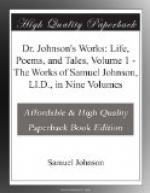On Johnson’s return from Cornelius Ford, Mr. Hunter, then master of the free school at Lichfield, refused to receive him again on that foundation. At this distance of time, what his reasons were, it is vain to inquire; but to refuse assistance to a lad of promising genius must be pronounced harsh and illiberal. It did not, however, stop the progress of the young student’s education. He was placed at another school, at Stourbridge in Worcestershire, under the care of Mr. Wentworth. Having gone through the rudiments of classic literature, he returned to his father’s house, and was probably intended for the trade of a bookseller. He has been heard to say that he could bind a book. At the end of two years, being then about nineteen, he went to assist the studies of a young gentleman, of the name of Corbet, to the university of Oxford; and on the 31st of October, 1728, both were entered of Pembroke college; Corbet as a gentleman-commoner, and Johnson as a commoner. The college tutor, Mr. Jordan, was a man of no genius; and Johnson, it seems, shewed an early contempt of mean abilities, in one or two instances behaving with insolence to that gentleman. Of his general conduct at the university there are no particulars that merit attention, except the translation of Pope’s Messiah, which was a college exercise imposed upon him as a task by Mr. Jordan. Corbet left the university in about two years, and Johnson’s salary ceased. He was, by consequence, straitened in his circumstances; but he still remained at college. Mr. Jordan, the tutor, went off to a living; and was succeeded by Dr. Adams, who afterwards became head of the college, and was esteemed through life for his learning, his talents, and his amiable character. Johnson grew more regular in his attendance. Ethics, theology, and classic literature, were his favourite studies. He discovered, notwithstanding, early symptoms of that wandering disposition of mind, which adhered to him to the end of his life. His reading was by fits and starts, undirected to any particular science. General philology, agreeably to his cousin Ford’s advice, was the object of his ambition. He received, at that time, an




